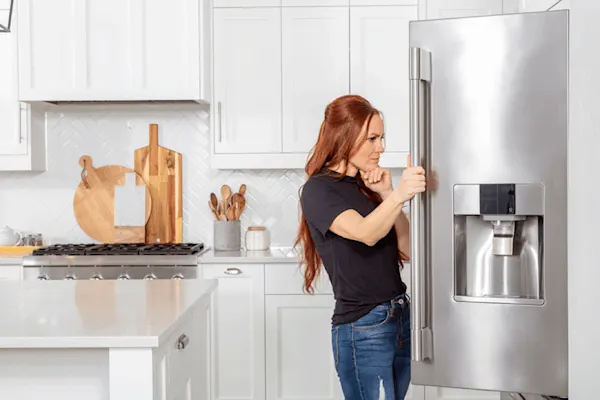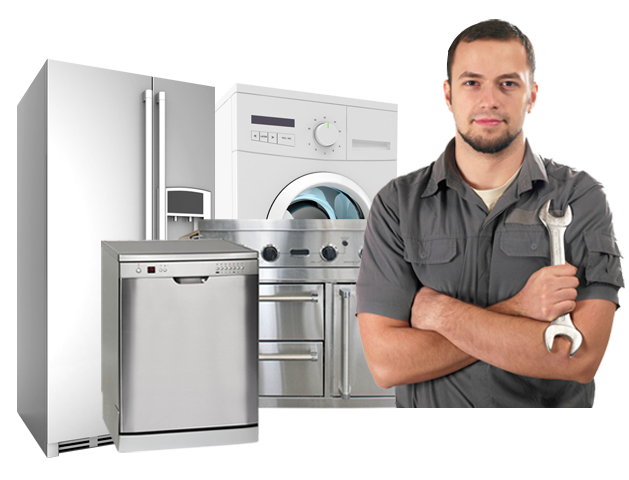The Ultimate Overview to Recognizing Appliance Repair at Home
When your refrigerator quits cooling down or your oven declines to heat, it can really feel overwhelming. Comprehending appliance repair at home can conserve you money and time. You'll discover to recognize signs and symptoms, utilize crucial tools, and comply with an organized troubleshooting process. Before you begin, there are crucial security preventative measures you need to take into account. What are the most usual troubles, and how can you repair them? Let's explore the basics.
Common Device Problems and Their Signs and symptoms
When your home appliances start acting up, it's vital to identify the signs beforehand. Neglecting them can bring about bigger problems and costly repairs. As an example, if your refrigerator isn't cooling down correctly, you might notice warm places or condensation developing. This might show a falling short compressor or an obstructed vent.Your dishwashing machine might show issues with dirty recipes or uncommon noises during cycles. If you listen to grinding or clanking, it's time to investigate.A cleaning machine that will not rotate or drain pipes can leave you with soaked washing, recommending a clogged drain or a malfunctioning pump.Lastly, if your stove's temperature level seems off or it takes permanently to pre-heat, you could be taking care of a malfunctioning thermostat. By remaining sharp to these symptoms, you can attend to issues before they intensify into major repair services.
Essential Tools for Appliance Repair Work
When you're taking on home appliance repair work at home, having the right tools is necessary. Basic hand devices like screwdrivers and pliers will certainly aid you disassemble and fix different devices, while electrical testing gadgets guarantee you're functioning safely with wiring. Allow's review what you need to start on your repair work trip.
Basic Hand Devices
Having the right devices is crucial for effective appliance repair service in your home. Begin with a trustworthy screwdriver set, including both flathead and Phillips types, as screws are common in home appliance assembly. Pliers are additionally vital; they help with gripping, turning, and cutting cables or tiny elements. A set of needle-nose pliers can get to limited areas conveniently. You'll need an excellent flexible wrench for tightening up or loosening nuts and screws. An utility blade is handy for puncturing product packaging or insulation. Ultimately, don't fail to remember a tough workbench or surface to safely organize your devices and components. With these basic hand devices, you'll be well-prepared to deal with most device repair services that come your method.
Electrical Screening Gadgets
Along with standard hand tools, electric screening devices play an essential function in device repair. These devices assist you detect electric concerns and warranty devices function safely. A multimeter is essential; it measures voltage, current, and resistance, enabling you to identify problems promptly. A non-contact voltage tester is an additional must-have, allowing you discover live cables without making direct call, enhancing your security. Secure meters are wonderful for determining existing flow in cables without disconnecting them, conserving you effort and time. In addition, circuit testers can swiftly inspect if electrical outlets are operating correctly. By utilizing these devices, you'll improve your troubleshooting procedure and boost your fixing abilities, making home appliance upkeep a great deal simpler.
Step-by-Step Overview to Diagnosing Device Issues
When your device breaks down, it can be irritating, yet identifying the issue doesn't need to be frustrating. You'll learn to identify common problems and use reliable troubleshooting methods. Let's go through the actions to get your home appliance back in functioning order.
Common Appliance Troubles

Fixing Strategies Clarified

Repairing Major Cooking Area Home Appliances: A Closer Look
Have you ever before asked yourself just how to tackle common problems with your kitchen area appliances? Fixing major kitchen area appliances like fridges, ovens, and dish washers can be much easier than you think. Beginning by determining the issue-- whether it's a fridge not cooling down or an oven that will not heat. Usually, a basic reset or checking the source of power can solve the issue.For fridges, clean the condenser coils and inspect the door seals. If your stove's not heating, check the burner and thermostat. Dishwashing machines might simply need a tidy filter or a reset to get them back in action. Always disconnect the device prior to diving into repairs to guarantee your safety.Don' t neglect to seek advice from the user manual for certain fixing ideas associated to your model. With a little persistence and the right tools, you can confidently deal with home appliance repair work and save money while doing so!

Fixing Washing Devices: Tips and Techniques
When your laundry devices start breaking down, it can feel overwhelming, yet fixing them doesn't have to be an inconvenience. Start by inspecting the power supply. Validate the home appliance is connected in and the outlet is working. Next off, evaluate the door or lid switch; a faulty switch can stop the machine from operating.For washers, if it's not rotating, look for unbalanced tons. Rearranging the clothes might address the concern. If your dryer isn't heating, tidy the dust filter and examine the vent for blockages.Listen for unusual noises; they can suggest a trouble. If your appliance is dripping, examine the hoses for fractures or loosened links. Document any mistake codes presented on digital displays, as they can lead you in identifying the issue. Seek advice from the individual guidebook for details repairing pointers connected to your version.
Safety And Security Precautions to Take During Repair works
Before you start any device repair work, it's important to focus on safety to protect against accidents or injuries. First, disconnect the appliance or turn off the circuit breaker to guarantee no power reaches it while you work. Usage insulated devices to minimize the risk of electric shock. Wear security goggles and handwear covers to shield yourself from sharp sides or debris (Dependable Refrigeration & Appliance Repair Service Dryer repair near me).Make particular your work area is tidy and well-lit, so you can see what you're doing. Maintain youngsters and animals away from the location to avoid interruptions and possible threats. If you're managing gas appliances, be extra careful; check for leakages before proceeding.Take your time, and do not hurry through fixings. If you really feel unclear concerning any type of action, it's far better to stop briefly and research than to guess. Following these safety measures will certainly assist develop a safer environment for your DIY appliance fixing task
When to Call a Specialist for Help
Exactly how do you recognize if it's time to employ a professional for home appliance repair services? If you Visit Website have actually attempted standard troubleshooting without success, it's a clear sign. As an example, if your appliance still won't start or reveals unusual noises after resetting it, do not wait to seek expert help.When you discover leaks, smoke, or shedding scents, focus on safety and call a pro promptly. These issues can result in more significant damages or pose risks to your home.Also, if your appliance is under guarantee, getting in touch with an expert is typically the very best route. They can guarantee that fixings won't nullify your service warranty, conserving you cash in the long run.Finally, if you're uncertain or uncomfortable with complicated repair work, it's smart to leave it see post to the specialists. Remember, tackling difficult issues without the right expertise can bring about pricey errors. Trust a specialist when unsure!
Often Asked Inquiries
How Can I Avoid Device Problems in the Future?
To stop home appliance problems in the future, you need to do routine upkeep, check for damage, tidy filters, and prevent overloading. Remaining aggressive will help prolong their lifespan and maintain them running smoothly.
What Are the Most Typical DIY Appliance Repair Work Mistakes?
You may ignore security precautions, miss troubleshooting actions, or make use of inaccurate devices when trying DIY device repairs. Rushing the procedure or ignoring producer standards can cause more significant issues and pricey blunders. Stay patient and notified!
How Do I Know if a Part Needs Substitute?
You can inform if a component needs substitute by looking for uncommon noises, leakages, or irregular efficiency. If the home appliance has a hard time to run correctly or reveals visible damages, it's likely time for a substitute.
Can I Make Use Of Generic Components for Device Repairs?
Yes, you can make use of generic parts for device repairs, however determine they're suitable - Dependable Refrigeration & Appliance Repair Service Washer repair near me. Generic components may save you cash, but they might affect efficiency or long life, so weigh your options carefully before deciding
What Warranties Cover Device Services?
Most device guarantees cover repairs for making issues, however they typically omit damages from abuse. Examine your warranty terms thoroughly, as some might require making use of certified technicians and initial parts for coverage to continue to be valid.